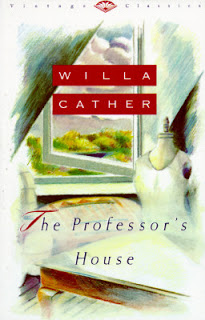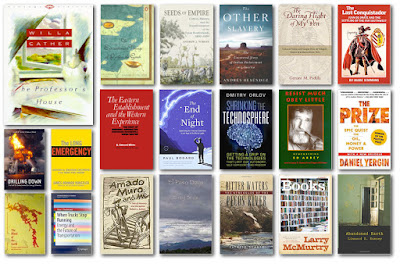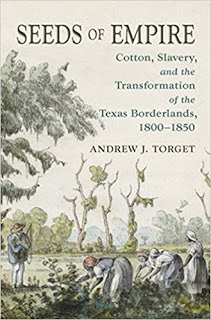
This has been a year of extra-intensive reading, the bulk of it for my book in-progress on Far West Texas. Specifically, I’ve had some catching up to do on the oil industry and New Mexico history (impossible to grok Far West Texas without those subjects). I say this every year but truly, this may have been my richest year of reading yet. I feel so lucky to have encountered these works; each and every one of these authors has my sincere admiration and immense gratitude.

1. The Professor’s House
by Willa Cather
A deeply weird and profoundly American novel. I had been meaning to read The Professor’s House for years, and I finally did– and by uncannily felicitous happenstance, just after visiting Acoma, Chaco Canyon, and Mesa Verde. (P.S. Whoever calls this book flawed I call a puddinghead.)
> Recommended: “The New York World of Willa Cather” at the Society Library, New York City.
2. The Extraordinary Voyage of Pytheas the Greek
by Barry Cunliffe
A brilliant book that evokes the ghost of a lost book and the world it came out of so unfathomably long ago. This is one I look forward to savoring again.
3. Tie:
Seeds of Empire: Cotton, Slavery, and the Transformation of the Texas Borderlands, 1800-1850
by Andrew J. Torget
The Other Slavery: The Uncovered Story of Indian Slavery in America
by Andrés Resendiz
For the past several years I have been reading intensively about Texas, and that includes its fraught ethnic relations, and with these two books about slavery– both recent and major scholarly contributions– by golly, the whole thang just gelled. For U.S. readers I recommend reading first Torget; then, without delay, Resendiz.
> Also recommended: Podcast interview with Andrew J. Torget by Liz Covart
> Also recommended: Podcast interview with Andres Resendiz by Liz Covart
4. Tie:
The Daring Flight of My Pen: Cultural Politics and Gaspar Pérez de Villagrá’s Historia de la Nueva Mexico, 1610
by Genaro M. Padilla
It astonishes me that so few Americans or Mexicans have ever heard of the epic poem Historia de la Nueva Mexico– and that would include Yours Truly, until I found The Daring Flight of My Pen. Padilla’s book about Pérez de Villagrá’s book rearranged all the furniture in the way I think about the U.S., about the Southwest, and about Mexico– and waxed the floor and put in new curtains, too.
The Last Conquistador: Juan de Oñate and the Settling of the Far Southwest
by Marc Simmons
I would recommend reading these two books together, first Simmons; then, without fail, Padilla.
5. The Eastern Establishment and the Western Experience:
The West of Frederic Remington, Theodore Roosevelt, and Owen Wister
by G. Edward White
This is an oldie, originally published in 1968 out of a PhD dissertation from Yale University’s American Studies. It may be little known, but it shouldn’t be. I’ll be referencing it in my own work.
6. The End of Night: Searching for Natural Darkness in an Age of Artificial Light
by Paul Bogard
Beautifully written, fully researched, verily eye-opening.
7. Shrinking the Technosphere
by Dmitri Orlov
This book has an important and urgent message, but it also comes with a gamelan orchestra of super-freaky esoteric undertones. In other words, to appreciate the clanging in there, you have to be ready to appreciate it. Not for the pleasantly numbed of Smombiedom.
8. Resist Much, Obey Little: Remembering Edward Abbey
Edited by James R. Hepworth and Gregory McNamee
Its impossible to go far into reading about the American West without encountering Edward Abbey and his works, and in particular his iconic Desert Solitaire. Resist Much, Obey Little, an eclectic collection of essays and interviews, is at once a festschrift and an adventure in the funhouse of Abbey’s mind.
9. Big Batch re: The Oil Patch
Having crunched through a library’s worth of reading on the oil industry, herewith a selection of some of the more worthy tomes:
The Prize: The Epic Quest for Oil, Money, and Power
by Daniel Yergin
This one won the Pulitzer Prize when it came out more than two decades ago, and most deservedly. It rewired my thinking about World War II, among many other episodes in the last century.
Drilling Down: The Gulf Oil Debacle and Our Energy Dilemma
by Joseph A. Tainter and Tadeusz W. Patzek
Some years back I had the privilege of being helicoptered out to a working oil platform. It was an unsettling and briskly sobering experience, and I suspect that it primed me to especially appreciate this book.
> Also recommended: Texas Observer interview with Tad Patzek
The Long Emergency: Surviving the End of Oil, Climate Change, and Other Converging Catastrophes of the Twenty-First Century
by James Howard Kunstler
So majestically and sometimes hilariously dismal! (I remain a faithful reader of Kunstler’s unspeakably-titled blog.)
The Blood of the Earth: As Essay on Magic and Peak Oil
John Michael Greer
Reading Greer is akin to spooning up Swiss chocolate pudding: page after page of smoothly yumsie schoggi. Yes, even if it’s got crunchy stuff about oil and– keep your crash helmets on!– magic.
When Trucks Stop Running: Energy and the Future of Transportation
by Alice Friedemann
This is another one I will be referencing at length when I write about I-10 and I-20, the heavily-trafficked interstate highways that cross the Trans-Pecos.
10. Tie:
Amado Muro and Me: A Tale of Honesty and Deception
by Robert Seltzer
El Paso Days
by Elroy Bode
More about Bode in this post.
11. Bitter Waters: The Struggles of the Pecos River
by Patrick Dearen
> Read my review about this book for Literal magazine.
12. Books: A Memoir
by Larry McMurtry
13. Abandoned Earth: Poems
Linwood D. Rumney
P.S. My amigas novelists and esayists Kathleen Alcalá and Leslie Pietrzyk offer lists of their top reads for 2017 here and here.
UPDATE: Poet Joseph Hutchison offers his list on his blog, The Perpetual Bird, here. I was so delighted and touched to see two chapbooks I had published some years ago, the extraordinary collection of poetry, Ghosts of the Palace of Blue Tiles by Jorge Fernández Granados, translated by John Oliver Simon (Tameme, 2008), and my translation of the short story by Agustín Cadena, An Avocado from Michoacán (Tameme, 2007). Gracias, Joseph, your mentions are an honor.
FURTHER UPDATE: My amiga poet, essayist and literary translator Patricia Dubrava offers her list of top reads on her blog, Holding the Light, here.

Top 12+ Books Read 2019
Top 10+ Books Read 2018
Great Power in One: Miss Charles Emily Wilson
Visit my website for more about my books, articles, and podcasts.





